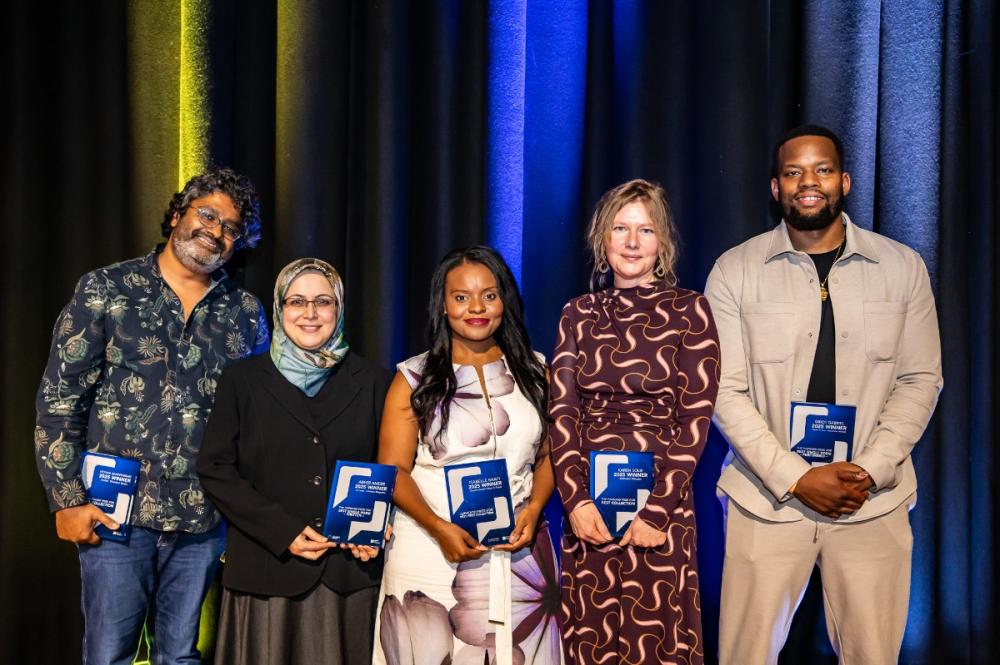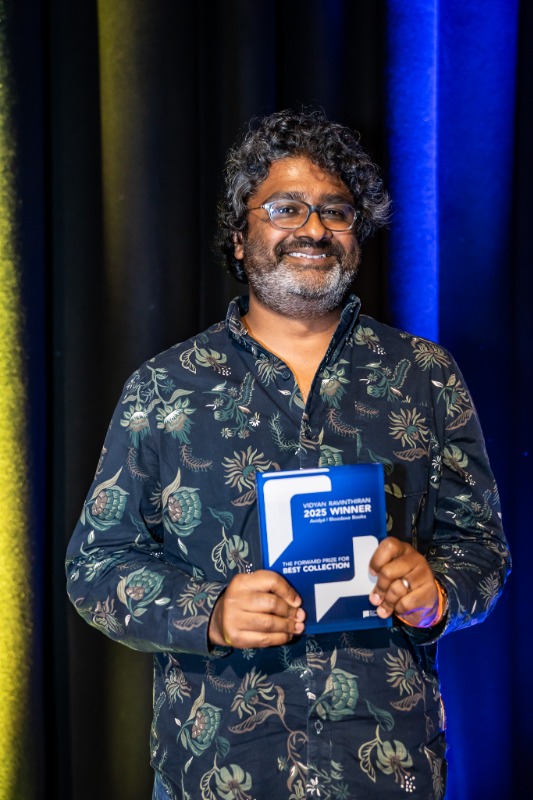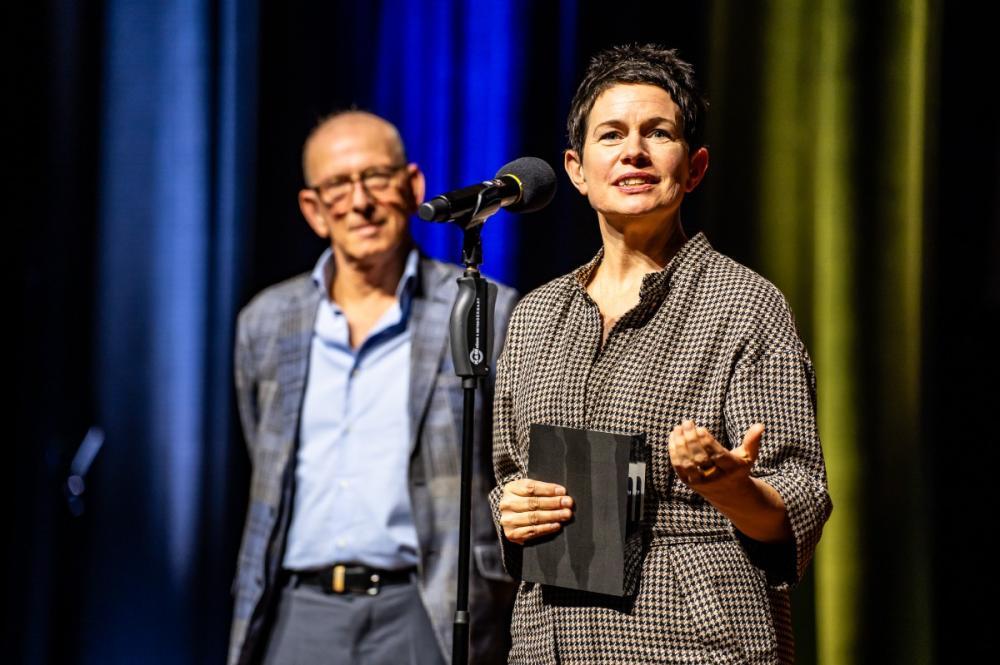search
date/time
 | Yorkshire Times A Voice of the Free Press |
1:00 AM 28th October 2025
arts
2025 Forward Prizes For Poetry Announce 'Radical' Winners And Joint Best Collection At Southbank Ceremony

Image by Neo Gilder
Following stunning performances from the shortlisted poets, the winners of the most coveted and influential prizes for poetry in the UK and Ireland were announced. For the first time in the prize’s history, Vidyan Ravinthiran’s Avidyā (Bloodaxe Books) and Karen Solie’s Wellwater (Picador, Pan Macmillan) were announced as joint-winners of the Forward Prize for Best Collection, taking home £5,000 each.
Isabelle Baafi’s debut Chaotic Good (Faber) won the Jerwood Prize for Best First Collection (£5,000); Abeer Ameer’s ‘At Least’, originally published in Modron Magazine, won the Forward Prize for Best Single Poem – Written (£1,000), and Griot Gabriel was the third-ever winner of the Forward Prize for Best Single Poem – Performed for ‘Where I’m From’, originally performed at Manchester UNESCO City of Literature (£1,000).
Renowned for championing new poetic voices and internationally celebrated writers alike, the winners “address the urgent challenges of our time – climate crisis; war and migration – with personal insight and philosophical depth,” commented judge Lisa Kelly.
Poetry’s unique ability to empathise and stand in solidarity with the world in times of crisis was echoed by chair of judges Sarah Hall, who said: “In such divisive times, with wars, genocide, the rollback of rights and environmental protections, and an erosion of truth taking place, it was buoying to read poetry from all corners of the globe and find within its diversity common ground — light, song, sincerity, humour, wisdom and courage. It’s more vital than ever to be culturally collegiate.”
Born in Leeds to Sri Lankan Tamils, and now based in Massachusetts, US, Vidyan Ravinthiran shared the coveted Forward Prize for Best Collection for his acclaimed Avidyā (Bloodaxe Books). Avidyā emerged from journeys of great personal significance, and out of a migrant sensibility tied to three different countries. Sensuous, droll, yearning, the poems consider otherwise forgotten (ignored, repressed, erased) events.
Karen Solie, born in Moose Jaw, Canada, and now based between Edinburgh, London and Canada, shared the Forward Prize for Best Collection with Vidyan for her collection Wellwater (Picador, Pan Macmillan). In poems that are supple, philosophical, bracingly honest and ribbed with erudition, Wellwater conducts a self-interrogative conversation with a culture in crisis and a natural world on the brink.
Isabelle Baafi, a London-based poet of Jamaican and South African heritage, collected the Jerwood Prize for Best First Collection for her debut Chaotic Good (Faber). Framed by the story of escape from a toxic marriage, Chaotic Good focuses on the incremental ways in which power accumulates, shifts and is relinquished within both home and community.
Abeer Ameer, a poet of Iraqi heritage living in Cardiff, was awarded the Forward Prize for Best Single Poem – Written. ‘At Least’ is Ameer’s devastating meditation on violence, loss, and the language we use to describe tragedy, originally published in Modron Magazine. The poem responds to the violence of airstrikes on a block of flats, and to the ways in which the language of Western media chooses to sanitise unspeakable violence. Modron Magazine is a newly established poetry magazine based in Wales, and is an example of the vitality of contemporary poetry as well as the small-scale poetry publisher that continues to shape the scene.
Manchester poet Griot Gabriel became the third-ever poet to win the celebrated Forward Prize for Best Single Poem – Performed category for his poem ‘Where I’m From’, originally performed at Manchester UNESCO City of Literature. Gabriel describes the poem as “a love letter to Manchester, specifically paying homage to my local communities of Longsight and Ardwick. It highlights both the joys and sorrows of my community, which seems to resonate deeply with people from various parts of the country.”
Chair of judges Sarah Hall further commented: “This prize is nothing if not radical, ingathering, communitarian and soul-searching; qualities clear and present in the work of the finalists. They are also technically brilliant, unique, indelible works. It’s been an absolute honour to read, listen to, watch and feel this poetry. Rather than judging it, I often felt critiqued by its literary, political and emotional propositions, and found myself needing to grow, then growing, for which I owe these incredible poets a huge debt of gratitude.”

Image by Neo Gilder
Judge Hannah Lavery said: “This year’s winners show just how many ways poetry can speak to us right now. We couldn’t choose between Avidyā by Vidyan Ravinthiran and Wellwater by Karen Solie for Best Collection — they’re so different in style, but equally powerful. Ravinthiran’s book is dazzling and searching, while Solie’s is rooted and elemental, alive to the world around us. Together, they show the range of what poetry can do. Isabelle Baafi’s debut, Chaotic Good, is playful, sharp and full of energy — a voice that feels completely fresh. Across all three books, what stood out was honesty, invention, and a sense of urgency. These are collections that don’t just speak to poetry readers, but to anyone looking for language that helps us make sense of the world.”
Judge Sean O’Brien said: “The dual winners of the Best Collection prize address unignorable crises – on one hand the environmental barbarism which may well finish us off, and on the other the collapse of a society into ethnic violence resulting in migration. If these books were merely topical they could hardly compete with the news media. But the poetic imagination, as Wordsworth wrote, enables us to ‘see into the life of things.’ We might add that poetry also reclaims the world from the merely habitual.
Karen Solie’s Wellwater commands the grim facts of ecological barbarism while rising at times to a melancholy grandeur rarely encountered nowadays. She traces the consuming invasiveness of capitalism to the innermost privacies of consciousness, showing how we sweep the mind for bugs we suspect we will never eradicate. Solie is also mordantly funny and richly ironical, an elegist and a satirist. In sum, she is a visionary.
Vidyan Ravinthiran’s Avidyā is an invitation to visit the sites of the civil war in Sri Lanka, the atrocities it produced, and to see their surviving ethnic and cultural imprint. The book also offers the chance to learn something of the religious and linguistic context, rather than feeling generalized outrage or sympathy. It’s no accident that the book’s title is Avidyā – ignorance, delusion. Ravinthiran, the child of immigrants to the UK, explores an ancestral homeland whose meanings are both vital and difficult of access. How are we to come at history, he asks, when we have not lived it?”

Image by Neo Gilder
Vidyan Ravinthiran and Karen Solie win joint first prize for Best Collection. This is the first time in the history of the Forward Prizes that this prize has been awarded to two collections. Passionate explorations of their respective themes, these collections are in conversation with the canon, without being beholden to it. Congratulations to both poets - and to all of the winners and shortlisted and longlisted writers. It has been an immense privilege to read this year’s entries.”
Co-Executive Director of the Forward Arts Foundation, Mónica Parle, said: “We at Forward are delighted by this result. Our incredibly committed judges endured numerous meetings this year to get us to this stage, and the decision to award joint-winners for the Best Collection category demonstrate the knife edge this task balances on. Contemporary poetry is such a vibrant form, with every single collection and poem shortlisted deserving of our attention and time. We have always viewed the prizes as an act of curation more than a single determination. The collections and poems should say something in themselves but also speak to each other.
Our shortlisted poets tackled some of the biggest issues of our day: migration, language, empire, the environment, gender dynamics and sexuality, and they perfectly capture lived experience in some unique and transformational way. In the end, it can be impossible to find a single, definitive answer in our complex world, and so we couldn’t be happier to share our five winners with you. We extend our deepest congratulations to all poets shortlisted, and the winners, and we urge all our readers to make their own calls.”
In collaboration with writing development agencies supporting emerging talent across the UK, Forward also hosts a Young Poets’ Summit on the day prior to the Prizes winners’ announcement, to bring together emerging poets and shortlistees through masterclasses, workshops, and panel talks.